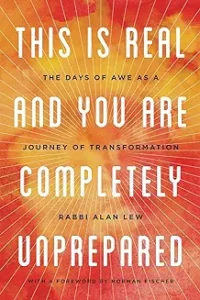This Is Real and You Are Completely Unprepared: The Days of Awe as a Journey of Transformation by Alan Lew 2003
For nearly 78 years, I have had a complex relationship with the Jewish High Holidays. The start of school when I was a student, the start of school when I was teaching at the Harvard Medical School, my birthday, and the High Holidays always seemed to get stirred into one large mass of discomfort and anxiety about where I was in my life. As intended, the hours of sitting in synagogue and chanting prayers about repentance, transformation, atonement, and the ultimate question of ‘who will be written in the book of life’ in the coming year, always left me so uncomortable that I never really took the time to study and understand the philosophy and theology behind Rosh Hashanah and Yom Kippur,
Enter Alan Lew, a Conservative rabbi of a congregation in San Francisco, who founded the first Jewish meditation center, and who sadly died suddenly in 2009 at the age of 65. Lew had been about to be ordained as a Zen Buddhist priest when an epiphany led him to embrace his Jewish roots.
His book was the ideal preparation for the High Holidays, readable, simple yet deep, and perfectly pitched at my level or lack of knowledge. Starting with the holiday of Tisha b’Av and moving through the 30 days of Elul and Selichot, the final Shabbat before the New Year, and then Rosh Hashanah, the ten days of Teshuvah, Kol Nidre, Yom Kippur, and Sukkot, Lew explains the relationship of the holidays to Torah, Talmud, and history in simple, elegant prose. The lessons are interrupted here and there by a humorous personal anecdote which serves to lighten the load and by Zen references to meditation, kindness, impermanance, and the inevitability of suffering and death.
Lew teaches that “the purpose of the ritual is to render the invisible visible and to reflect a profound, universal, unseen and unspoken reality.” The cycle of these holy days is designed to get our attention so that we do the hard work of self-assessment required for Teshuvah, turning away from sin, evil, and the bad behavior that can often be a temptation in our too fast and too materially oriented world. Contemplating the destruction of the Temple in 60 BCE, one realizes that the world of objects and riches is always dangerously at risk. Spending each of the 30 days of Elul examining our own fragility and behavior leads us to the ten days of Teshuvah—how will we change the way we behave in the coming year? Having spent those weeks in self-assessment and contemplation, we approach God on Yom Kippur and plead that we will be inscribed in the Book of Life in the coming year.
Whether you are a religious person who believes in God or not, this annual cycle of introspection, transformation, atonement, and resetting one’s moral compass seems to be a valuable exercise. In Christianity, bad behavior lands one in Hell. In Buddhism, bad behavior prevents one from achieving enlightenment and returning in another life. In Judaism, bad behavior runs the risk of not being inscribed in the Book of Life, i.e. dying. These are all similar in that they are belief systems designed to move man from bad to good, from selfish acts to acts of kindness.
If you, like me, nehave always go to synagogue for the High Holidays every year but can’t quite remember what Tish b’Av commemmorates, thinks that Elul might have been a shortstop for the White Sox in the 1970’s, and spends most of the time in there making mental ‘to do’ lists for the coming week, read Lew. It’s informative and having finished it as Kol Nidre loomed that evening, it’s even inspirational. I intend to re-read it every year beginning on Tish b’Av, which I now know that it begins an important cycle of events that if observed, will likely make me a better person in the year ahead, that is, if I’m successful in getting inscribed in the Book of Life.



